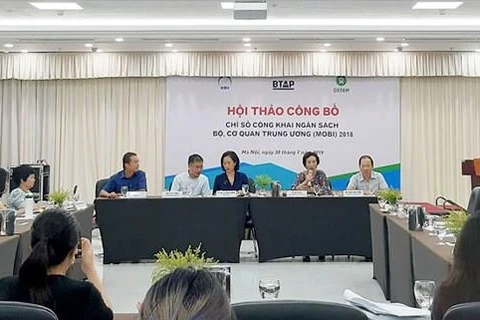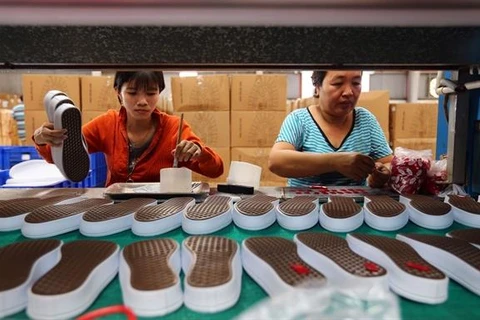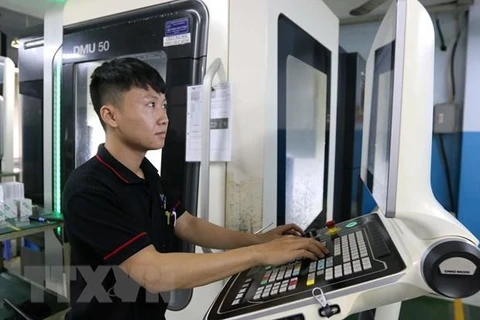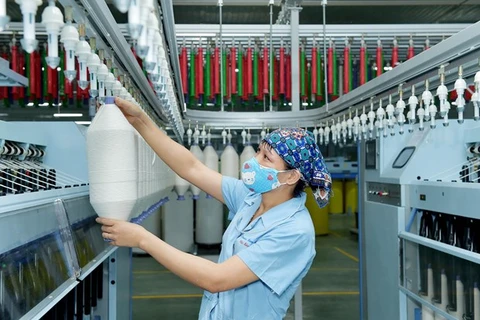 Aging labour equipped with poor skills is causing a hurdle in the way of the development of the Mekong Delta. (Photo: VietnamPlus)
Aging labour equipped with poor skills is causing a hurdle in the way of the development of the Mekong Delta. (Photo: VietnamPlus)
Hanoi (VNA) – Aging labour with equipped with poor skills is raising a hurdle in the way of the development of the Mekong Delta, and that is why experts have proposed that there must be suitable policies to keep young labourers in agriculture.
Implementing Resolution 120/NQ-CP dated November 17, 2017 on sustainably developing the Mekong Delta resililent to climate change, the Institute of Policy and Strategy for Agriculture and Rural Development (IPSARD) is building a project on the occupation shift and job creation for agricultural and rural labourers of the Mekong Delta.
On August 1, the IPSARD joined hands with the Department of Cooperative Economy and Rural Development under the Ministry of Agriculture and Rural Development, with support from the Australian programme for support of Vietnam’s economic reform (Aus4Reform) to hold a conference on the occupation shift and job creation for agricultural and rural labourers of the Mekong Delta.
At the function, speakers presented an overall panorama on labour and job in agriculture in the Mekong Delta, the hurdles in job training, shift and creation for agricultural labourers in the context of economic development, agriculture restructuring resilient to regional climate change.
Tran Thi Thanh Nhan, an official from the IPSARD, pointed out the labour shortage when seasons come, the popular “rural desertion” with the main human resources being mainly old people with poor skills. Besides, the unstable development of firms processing agriculture, forestry and fishery products that offer low incomes are also the factors have made the shift to non-agriculture production a hard nut to crack.
The conference created a chance for delegates to discuss on measures and policies to raise the efficiency of the programmes on supporting vocational training and those on the promotion of job creation for agricultural and rural labourers in the region, on the basis of which productivity can be raised, high and stable incomes generated for workers, and at the same time stable and high quality workforce created for the regional economic development.
At the event, experiences and factors ensuring successes and challenges for localities in labour structure shift to meet the requirement of agricultural restructuring, as well as the implementation of the programmes and policies on vocational training to create jobs and keep labourers to rural areas were also discussed by participants.
 Conference on occupation shift and job creation for agricultural and rural labouers in Mekong Delta held on July 1 (Photo: VietnamPlus)
Conference on occupation shift and job creation for agricultural and rural labouers in Mekong Delta held on July 1 (Photo: VietnamPlus) Truong Tien Tho, Vice Director of the Agriculture and Rural Development Department of An Giang province, raised his policy proposals, including hiking vocational training support for rural labourers (both trainers and trainees) after 2020, the “One Cooperative – One Product” programme, the agriculture restructuring and the agriculture with high tech applications in localities.
“Managers of all levels should apply policies to help the labourers borrow capital after they are trained in agriculture so that they can make investments into the development of production, from that jobs can be generated,” he said./.
The Australian programme for support of Vietnam’s economic reform (Aus4Reform), financed by the Australian Depart for Foreign Affairs and Trade (DFAT), aims to support the Vietnamese Government in realising the goals of improving the investment and business environment in the direction of raising the labour productivity, quality and competitiveness of the economy, towards rapid and sustainable development. The programme has a value of 6.5 million AUD and will work for four years, from 2017 to 2021./.























